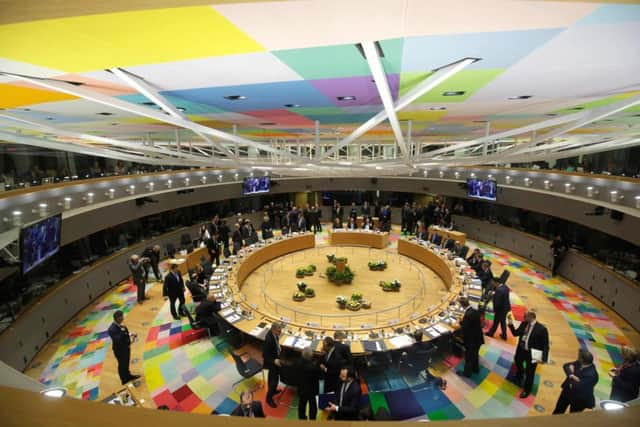Tories in open revolt over plan to allow votes on Brexit alternatives
Brexiteer Tories accused Prime Minister Theresa May of setting up a “national humiliation” by allowing MPs the chance to pick their favoured outcome – having already angered Eurosceptics in her party by agreeing to delay Brexit. There were reports that 18 pro-EU ministers, including Scottish Secretary David Mundell, were prepared to quit if “indicative votes” are not held.
MPs were expected to try and force a series of votes on Brexit alternatives next week, but two ministers said they expected the government to offer Parliament a say.
Advertisement
Hide AdAdvertisement
Hide AdAnd in meetings with opposition figures including the SNP’s Westminster leader Ian Blackford, the Prime Minister’s deputy, Cabinet Office minister David Lidington, is understood to have set out plans for votes on up to seven different options for Brexit. Mrs May agreed an extension to Article 50 of at least two weeks in late-night talks in Brussels on Thursday, opening the door for MPs to demand a change of course.


Brexit minister Kwasi Kwarteng said he would “be surprised” if the government did not allow MPs a free vote if indicative votes are brought forward. And the Business Secretary Greg Clarke said the government would “facilitate” votes to allow “Parliament to express a majority of what it would approve”.
Former Brexit minister Steve Baker said indicative votes meant “national humiliation is imminent”, while fellow Tory Brexiteer Mark Francois said: “If there is no government position on any of those issues about the future of our country, then there isn’t really a government.”
Tory MP Nick Boles, who quit his local party to avoid probable deselection over his campaign for a soft Brexit, suggested colleagues should ignore the government’s orders about how to vote if they were “not in the national interest”.
There were reports that the chairman of the backbench 1922 Committee, Sir Graham Brady, visited Mrs May in No 10 on Monday to warn of growing discontent after being “bombarded” with texts from MPs calling for her to quit.
Downing Street would not be drawn on when the Prime Minister intends to bring her deal back to the Commons for a third vote next week.
The DUP appeared to end any hopes of the deal passing in a damning statement from the party’s Westminster leader, Nigel Dodds, who said Mrs May had been “far too willing to capitulate before securing the necessary changes which would get an agreement through the House of Commons”.
He said: “The Prime Minister missed an opportunity at the EU Council to put forward proposals which could have improved the prospects of an acceptable withdrawal agreement. That failure is all the more inexcusable given the clear divisions which became evident amongst EU member states when faced with outcomes they don’t like.”
Advertisement
Hide AdAdvertisement
Hide AdHaving agreed an extension that leaves the door open to the UK staying in the EU for longer, European leaders warned they were still prepared to let the UK crash out without a deal. French president Emmanuel Macron said the EU will “not remain hostage to Brexit”. He also renewed attacks on Brexit campaigners, saying: “They told the people, ‘It’ll be easy, it’ll be quick! There were a lot of lies.”